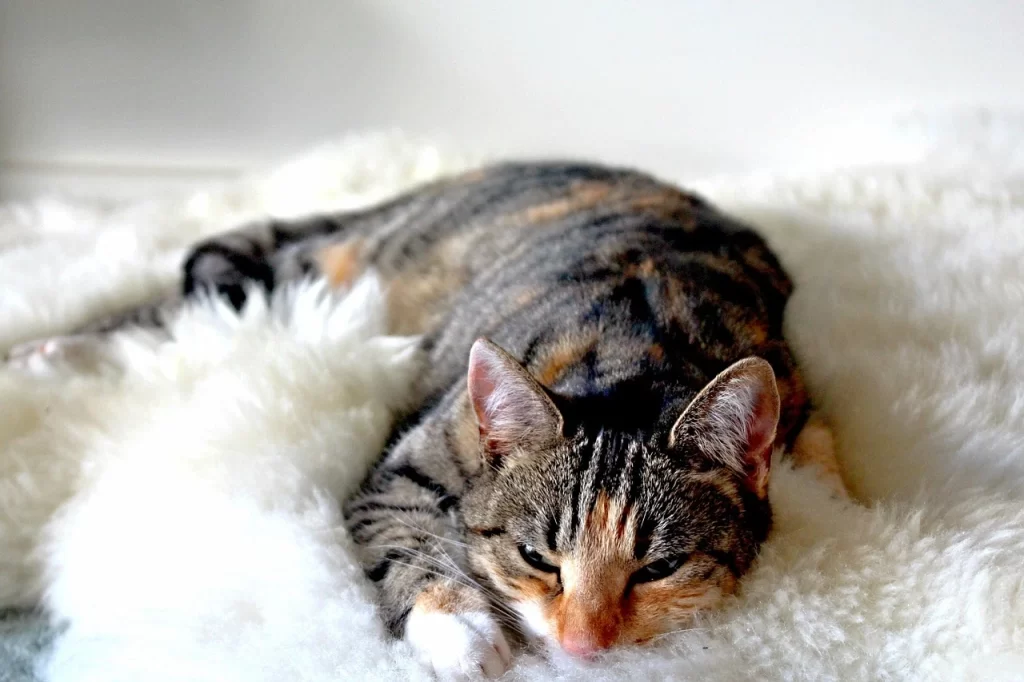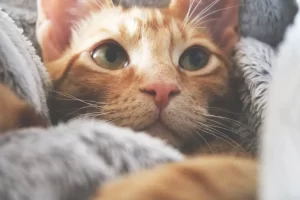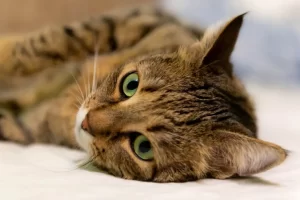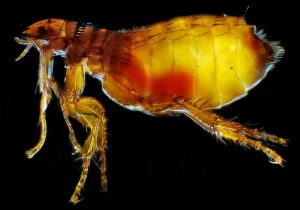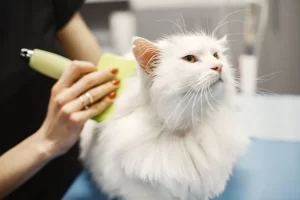Cat asthma is a chronic respiratory condition that affects many cats and can be a serious concern for their owners. The symptoms of cat asthma can range from coughing and wheezing to difficulty breathing and can be triggered by a variety of environmental factors. However, there are many home remedies and treatments available to help manage and control the condition. In this article, we will cover the main topics including an overview of cat asthma, its causes, the importance of early diagnosis, environmental control measures, nutritional and dietary changes, herbal and natural remedies, essential oils and aromatherapy, acupuncture and other alternative therapies, medications and drug therapies, probiotics, regular veterinary check-ups and monitoring, tips for managing asthma during flare-ups, creating an asthma action plan, keeping your cat indoors, and stress reduction and behavior modification
Table of Contents
ToggleCat asthma and its symptoms
Cat asthma is a chronic respiratory condition that affects many cats, characterized by inflammation and narrowing of the airways. It is similar to asthma in humans and can cause a variety of symptoms. Some of the most common symptoms include:
- Coughing: This is a common symptom of cat asthma, and can be dry or productive (meaning that it produces mucus). It may be more pronounced at night or early in the morning.
- Wheezing: This is a high-pitched whistling sound that can be heard when a cat breathes. It occurs due to the narrowed airways in the lungs.
- Difficulty breathing: Cats with asthma may have difficulty breathing, which can be seen as open-mouthed breathing, panting, or a rapid breathing rate.
- Rapid breathing: Asthmatic cats may have an increased respiratory rate, which can be a sign of respiratory distress.
- Decreased appetite: Asthmatic cats may have a decreased appetite, which can lead to weight loss.
- Fatigue: Cats with asthma may become tired more easily and have a lack of energy.
- Exercise intolerance: Cats with asthma may have difficulty with exercise and may tire easily.
It’s important to note that asthma in cats can be a serious condition and if left untreated, it can lead to severe respiratory distress and even death. Therefore, early diagnosis and treatment are crucial to managing the condition and improving the quality of life for cats with asthma. Also, you should have in mind that some of these symptoms are common between asthma and cat colds. If your cat has a cold, you can consider using these home remedies.
Causes of cat asthma
The exact cause of cat asthma is not fully understood, but it is believed to be triggered by a variety of environmental factors. Some of the most common causes of cat asthma include:
- Allergens: Cats can develop asthma as a result of an allergic reaction to certain substances such as dust, pollen, mold, and feathers.
- Smoke: Exposure to smoke, whether from cigarettes, fireplaces, or other sources, can trigger asthma symptoms in cats.
- Air pollution: Exposure to air pollution, such as car exhaust or industrial emissions, can also trigger asthma symptoms in cats.
- Certain Medications: some medications like beta-blockers, can cause asthma in cats as a side effect.
- Infections: Respiratory infections such as feline herpesvirus or Bordetella bronchiseptica can cause inflammation in the airways and trigger asthma symptoms. Check out these home treatments for a cat infected by feline herpes.
- Stress: Stress can also play a role in the development and exacerbation of asthma in cats.
It’s worth noting that not all cats with asthma have a clear trigger, and in some cases, the condition may be idiopathic (meaning that the cause is unknown). Additionally, some cats may be genetically predisposed to developing asthma.
The importance of early diagnosis and treatment
Early diagnosis and treatment of cat asthma are crucial for managing the condition and improving the quality of life for affected cats. Some of the reasons why early diagnosis and treatment are important to include:
- Early treatment can prevent the progression of the disease: By identifying and treating asthma early, it may be possible to prevent the condition from becoming more severe and causing permanent damage to the airways.
- Improved quality of life: Cats with asthma that receive early and appropriate treatment tend to have a better quality of life than those that are not treated.
- Preventing complications: Asthma can cause a number of complications if left untreated, such as pneumonia and respiratory failure. Early treatment can help prevent these complications from occurring.
- Cost-effective: early treatment can be more cost-effective than dealing with complications that may arise from delayed treatment.
- Proper diagnosis: early diagnosis can help differentiate asthma from other respiratory conditions, and prevent misdiagnosis.
It’s important to note that diagnosis of cat asthma can be challenging and may require a combination of clinical signs, and diagnostic tests such as x-ray, blood work, and bronchoscopy. A veterinarian should be consulted if you suspect your cat is showing signs of asthma.
Read More: How often do you take a cat to the vet?
How to reduce asthma triggers
Environmental control measures can be an important part of managing cat asthma by reducing exposure to triggers that can exacerbate the condition. Some of the most common environmental control measures include:
- Allergen reduction: This can involve steps such as using air filters, vacuuming regularly with a HEPA filter, and removing carpets and curtains that can collect dust.
- Reducing smoke exposure: This can involve steps such as not smoking inside the house, using an air purifier, and avoiding the use of fireplaces or wood stoves.
- Reducing air pollution exposure: This can involve steps such as keeping windows closed during high pollution times and using an air purifier.
- Maintaining good ventilation: This can involve steps such as keeping windows open to allow fresh air to circulate and using a dehumidifier to reduce mold growth.
- Reducing stress: This can involve steps such as providing a quiet, comfortable environment for your cat, and avoiding changes in the cat’s routine.
- Proper cleaning: Regular cleaning and disinfecting to minimize the risk of respiratory infections
It’s important to note that not all cats with asthma have a clear trigger and environmental control measures may not be effective in all cases. Your veterinarian can help you to identify and minimize exposure to triggers that may be exacerbating your cat’s asthma.
Nutritions and diets for respiratory health in cats with asthma
Nutritional and dietary changes can also play an important role in managing cat asthma and supporting respiratory health. Some of the most common dietary changes include:
- Feeding a high-quality, hypoallergenic diet: Some cats with asthma may be sensitive to certain proteins or food additives, so switching to a hypoallergenic diet can help reduce symptoms.
- Feeding a high-fat diet: High-fat diets can help to reduce inflammation in the airways and improve breathing.
- Feeding a diet that is high in antioxidants: Antioxidants can help to reduce inflammation and support overall respiratory health.
- Feeding a diet that is high in omega-3 fatty acids: Omega-3 fatty acids can also help to reduce inflammation and support overall respiratory health.
- Feeding a diet that is high in Vitamin E and Vitamin C: These vitamins are important for the immune system and can help to reduce inflammation.
- Feeding a diet that is low in carbohydrates: Some cats with asthma may have a carbohydrate intolerance which can lead to inflammation in the airways.
Examples of diets that are suitable for cat asthma include:
- Grain-free and high-protein diet
- Fish-based diet (salmon, sardines, mackerel) as they are a great source of omega-3 fatty acids
- Limited ingredient diet (LID)
- A prescription diet like Royal Canin Hypoallergenic or Hill’s z/d ultra
It is important to note that dietary changes should be made under the guidance of a veterinarian as dietary changes alone may not be enough to manage asthma symptoms, and may not be suitable for all cats with asthma.
Herbal and natural remedies for cat asthma
Herbal and natural remedies can be used in conjunction with traditional medical treatment to help manage cat asthma. However, it is important to note that these remedies should be used under the guidance of a veterinarian, as some herbs may interact with other medications and may not be suitable for all cats.
- Butterbur: This herb is believed to have anti-inflammatory properties and may be helpful in reducing asthma symptoms. It is available in capsule form and can be given to cats orally.
- Bromelain: This is an enzyme derived from pineapples, which may help to reduce inflammation in the airways. It can be given to cats in capsule form.
- N-acetylcysteine (NAC): This supplement is an antioxidant that can help to reduce inflammation and support respiratory health. It can be given to cats in capsule form.
- Quercetin: This is a natural antihistamine and antioxidant that can help to reduce inflammation and support respiratory health. It can be given to cats in capsule form.
- Echinacea: This herb is believed to have immune-boosting properties and may be helpful in reducing asthma symptoms. It is available in tincture or capsule form and can be given to cats orally.
- Licorice root: This herb has anti-inflammatory properties and can be helpful for respiratory issues. It can be given to cats in capsule form or as a tea.
- Marshmallow root: This herb can help to soothe and protect the respiratory system. It can be given to cats as a tea or in capsule form
It is important to note that not all herbs are safe for cats, and some may cause side effects, so it’s important to work with a veterinarian experienced in herbal medicine to determine the appropriate dosage and to monitor the cat’s response to treatment.
Essential oils and aromatherapy for cats with asthma
Essential oils and aromatherapy can be used to help manage cat asthma, however, it is important to note that essential oils can be toxic to cats if not used properly, so it is important to use them under the guidance of a veterinarian experienced in aromatherapy.
- Peppermint oil: Peppermint oil is believed to have anti-inflammatory properties and can be helpful in reducing asthma symptoms. It can be diffused in the air or applied topically with carrier oil.
- Eucalyptus oil: Eucalyptus oil is believed to have respiratory benefits and can be helpful in managing asthma symptoms. It can be diffused in the air or applied topically with carrier oil.
- Tea tree oil: Tea tree oil has anti-inflammatory and antimicrobial properties and can be helpful in reducing asthma symptoms. It should be used with caution, as it can be toxic to cats if applied topically or ingested.
- Lavender oil: Lavender oil is believed to have a calming effect and can help to reduce stress, which can exacerbate asthma symptoms. It can be diffused in the air or applied topically with carrier oil.
- Frankincense oil: Frankincense oil has anti-inflammatory properties and can be helpful in reducing asthma symptoms. It can be diffused in the air or applied topically with carrier oil.
It’s important to remember that cats have a more sensitive sense of smell compared to humans and they can be sensitive to certain oils. It is also important to use a very low dilution and to avoid using oils directly on the cat’s fur, as this can be toxic. It is also important to check if the oil is safe for cats as some oils are toxic to cats when ingested or inhaled.
Acupuncture and other alternative therapies
Acupuncture and other alternative therapies can be used to help manage cat asthma, however, it is important to note that these therapies should be used under the guidance of a veterinarian experienced in alternative medicine.
- Acupuncture: Acupuncture is a traditional Chinese medicine therapy that involves the insertion of thin needles into specific points on the body to stimulate healing. It is believed to help reduce inflammation and improve respiratory function in cats with asthma.
- Chiropractic: Chiropractic is a form of alternative medicine that involves the manipulation of the spine to improve the function of the nervous system. It can be helpful in reducing inflammation and improving respiratory function in cats with asthma.
- Homeopathy: A homeopathy is a form of alternative medicine that uses highly diluted substances to stimulate the body’s healing response. Homeopathy remedies may help in reducing inflammation and improving respiratory function in cats with asthma.
- Herbal Medicine: Herbal medicine uses natural substances, such as plants, to help manage asthma symptoms. Herbal remedies can be used in conjunction with traditional medical treatment, but it is important to work with a veterinarian experienced in herbal medicine to determine the appropriate dosage and to monitor the cat’s response to treatment.
It’s important to note that alternative therapies should not replace traditional medical treatment but can be used as a complementary therapy to help manage asthma symptoms. It is also important to work with a veterinarian experienced in alternative medicine to determine the appropriate therapy for the cat’s individual case and to monitor the cat’s response to treatment.
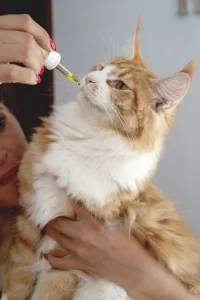
Medications and drug therapies used to treat cat asthma
Medications and drug therapies are commonly used to treat cat asthma and should be used under the guidance of a veterinarian experienced in treating cat asthma.
- Corticosteroids: Corticosteroids, such as prednisone and triamcinolone, are anti-inflammatory medications that can be used to reduce inflammation and improve respiratory function in cats with asthma. These medications can be administered orally, topically, or through inhalation.
- Bronchodilators: Bronchodilators, such as terbutaline and salbutamol, are medications that relax the muscles in the airways and can be used to improve breathing in cats with asthma. These medications are typically administered through inhalation.
- Anticholinergics: Anticholinergics, such as ipratropium, are medications that can be used to improve breathing in cats with asthma. These medications are typically administered through inhalation.
- Immunomodulators: Immunomodulators, such as cyclosporine, are medications that can be used to suppress the immune system and reduce inflammation in cats with asthma. These medications can be administered orally or topically.
- Antibiotics: Antibiotics can be used to treat secondary bacterial infections in cats with asthma.
It’s important to note that each cat’s case is unique, and the type and dosage of medication will vary depending on the severity of asthma and the cat’s response to treatment. It is also important to work with a veterinarian experienced in treating cat asthma to monitor the cat’s response to treatment and to adjust the treatment plan as needed.
The role of probiotics in managing cat asthma
The role of probiotics in managing cat asthma is an area of ongoing research. Probiotics are live microorganisms that can have beneficial effects on the host when consumed in adequate amounts. They are commonly found in fermented foods such as yogurt, kefir, and kimchi, and are also available in supplement form.
- Probiotics may improve the balance of gut bacteria, which can have a positive effect on the immune system and reduce inflammation.
- Probiotics may also improve respiratory function by reducing the number of inflammatory cells in the airways.
- Probiotics may also help to reduce the number of allergens in the airways by decreasing the amount of histamine released by immune cells.
- Probiotics may also improve the overall health of the respiratory system by strengthening the mucous membranes and reducing the risk of infection.
It is important to note that probiotics should not replace traditional medical treatment but can be used as a complementary therapy to help manage asthma symptoms. It is also important to work with a veterinarian experienced in alternative medicine to determine the appropriate dosage and to monitor the cat’s response to treatment.
Regular vet check-ups: A key component of cat asthma management
The importance of regular veterinary check-ups and monitoring is crucial for cats with asthma. Asthma is a chronic condition that requires ongoing management, and regular check-ups with a veterinarian can help ensure that the cat’s condition is being effectively managed.
- Regular check-ups allow the veterinarian to monitor the cat’s respiratory function and adjust treatment plans as needed.
- Regular check-ups can help to identify any potential complications or side effects of treatment.
- Regular check-ups can help to ensure that the cat is receiving the appropriate treatment and that the treatment is effective.
- Regular check-ups can also be an opportunity to discuss any changes in the cat’s environment or lifestyle that may be affecting their asthma.
- Regular check-ups can also be a chance to evaluate the cat’s overall health and to address any other health concerns that may be related to the cat’s asthma.
It is important to note that cats with asthma should have regular check-ups with a veterinarian, typically every 6-12 months. However, if a cat’s symptoms worsen or if there are any changes in the cat’s condition, the veterinarian should be contacted immediately.
Related article: How often do you take a cat to the vet?
Tips for managing asthma during flare-ups
Tips for managing asthma during flare-ups are important for cat owners to be aware of, as flare-ups can be serious and require immediate attention.
- Administer any prescribed medication as directed by the veterinarian. If a cat is experiencing an asthma attack, it may be necessary to give a higher dose of medication than usual.
- Create a calm and quiet environment for the cat. Stress can exacerbate asthma symptoms, so it is important to create a calm and peaceful environment for the cat during a flare-up.
- Monitor the cat’s breathing and heart rate. If the cat’s breathing becomes labored or the heart rate becomes elevated, seek veterinary care immediately.
- Keep a journal of the cat’s symptoms and triggers. This can be helpful in identifying patterns and triggers that can be avoided in the future.
- Keep an emergency plan in place. Make sure you know where the nearest emergency vet is located and have a plan in place in case of a severe asthma attack.
It is important to note that during a severe asthma attack, the cat should be taken to the vet immediately for further treatment. It’s also important to have an emergency plan in place and to be familiar with the signs of an asthma attack, so that you can respond quickly in case of an emergency.
Create an asthma action plan
Creating an asthma action plan for your cat is an important step in managing the condition and ensuring that your cat receives the proper care during an asthma attack or flare-up.
- Work with your veterinarian to develop a plan that includes information about your cat’s specific triggers, symptoms, and treatment options.
- Keep a journal of your cat’s symptoms and triggers. This can help you identify patterns and triggers that can be avoided in the future.
- Keep a list of your cat’s medications, dosages, and administration instructions. Also, make sure you understand when and how to use them.
- Keep an emergency plan in place. Make sure you know where the nearest emergency vet is located and have a plan in place in case of a severe asthma attack.
- Keep a list of important phone numbers, including your veterinarian’s office, an emergency vet clinic, and an after-hours emergency number.
- Keep a spare inhaler or nebulizer on hand. If your cat uses an inhaler or nebulizer, make sure you have a spare on hand in case of an emergency.
- Make sure everyone in the household is aware of the asthma action plan and knows how to respond in case of an emergency.
It is important to note that an asthma action plan should be reviewed and updated regularly with your veterinarian to ensure that it remains current and effective in managing your cat’s asthma.
Reducing asthma triggers through indoor cat living
Keeping your cat indoors can be an effective way to reduce exposure to asthma triggers and improve the overall health of your cat. Here are a few reasons why:
- Outdoor air pollution: Outdoor air pollution can include things like pesticides, car exhaust, and industrial emissions, which can all be triggers for asthma. By keeping your cat indoors, you can reduce exposure to these triggers.
- Allergens: Outdoor allergens like pollen, mold, and dust mites can be major triggers for asthma. By keeping your cat indoors, you can reduce exposure to these allergens.
- Weather fluctuations: Extreme temperatures, humidity, and weather fluctuations can all be triggers for asthma. By keeping your cat indoors, you can provide a more stable and consistent environment.
- Outdoor parasites: Outdoor parasites like fleas, ticks, and mosquitoes can all be triggers for asthma. By keeping your cat indoors or following these remedies, you can reduce exposure to these parasites.
- Outdoor predators: Outdoor predators like dogs, raccoons, and birds of prey can be a source of stress for cats, which can exacerbate asthma symptoms.
It’s important to note that keeping your cat indoors doesn’t mean it can’t enjoy the benefits of nature. You can still provide a comfortable and stimulating environment for your cat indoors, and even simulate outdoor activities like climbing and scratching, providing them with a safe and happy life.
Managing Asthma through Stress Reduction and Behavior Modification
Stress reduction and behavior modification are important components of managing cat asthma.
- Stress can exacerbate asthma symptoms and trigger asthma attacks, so reducing stress in your cat’s environment can help to improve the overall management of their condition.
- Some common sources of stress for cats include changes in their environment, changes in their routine or schedule, and the presence of other pets or unfamiliar animals.
- Behavior modification techniques such as environmental enrichment, positive reinforcement training, and pheromone therapy can help to reduce stress in your cat’s environment.
- Environmental enrichment can include things like providing your cat with a variety of toys, climbing structures, and scratching posts to keep them mentally and physically stimulated.
- Positive reinforcement training can include things like clicker training, which can help to build a positive association between your cat and the things in their environment.
- Pheromone therapy can include things like using synthetic feline pheromones to create a sense of calm and security in your cat’s environment.
- Regular veterinary check-ups and monitoring are important to ensure your cat’s physical and mental well-being as well as to provide a personalized approach to manage your cat’s asthma.
It is important to note that stress reduction and behavior modification may not be the only solution, they should be used in conjunction with other management techniques like environmental control measures, medication and diet changes. Consult your veterinarian for a personalized approach to manage your cat’s asthma.
Supplements for managing cat asthma
Supplements can be a useful tool in managing cat asthma. Some common supplements used for cat asthma include:
- Omega-3 fatty acids: These are essential fatty acids that can help to reduce inflammation in the airways and improve overall respiratory health. Fish oil is a common source of omega-3 fatty acids.
- Vitamin C: An antioxidant that can help to reduce inflammation and improve overall immune function.
- Antioxidants: Such as Vitamin E and Selenium, can help to reduce oxidative stress and improve overall respiratory health.
- Probiotics: They can help to support a healthy gut microbiome, which in turn can support respiratory health.
It is important to consult your veterinarian before giving your cat any supplements, as they may interact with other medications your cat is taking, or may not be suitable for your cat’s specific condition. Your veterinarian may also recommend other specific supplements depending on the underlying cause of your cat’s asthma.
It is important to note that supplements should be used as a complementary approach to manage cat asthma, and not as a replacement for other treatments like environmental control measures, medication, and diet changes.
What if cat asthma is left untreated
If cat asthma is left untreated, it can lead to a number of serious complications. Some of these complications include:
- Progressive respiratory distress: If the inflammation in the airways is not treated, it can lead to progressive narrowing of the airways, making it more difficult for your cat to breathe.
- Pneumonia: Severe asthma can lead to pneumonia, a serious lung infection that can be life-threatening.
- Chronic coughing and wheezing: Untreated asthma can lead to chronic coughing and wheezing, which can cause discomfort and distress for your cat.
- Loss of appetite and weight loss: Cats with asthma may lose their appetite and lose weight due to difficulty breathing and other symptoms.
- Reduced quality of life: Untreated asthma can greatly reduce your cat’s quality of life and make it difficult for them to perform basic activities like eating, playing and sleeping.
- Sudden death: In severe cases, asthma can lead to sudden death, especially if the cat has an acute asthma attack and not treated immediately.
It is important to seek veterinary care as soon as possible if you suspect your cat has asthma, to help prevent these complications and improve their overall quality of life.
Asthma risk factors: Age, breed, and more
The risk of developing cat asthma and the severity of symptoms can depend on a variety of factors, including age, breed, and overall health. Some specific factors that may affect the risk and severity of asthma in cats include:
- Age: Cats that are older may be more likely to develop asthma, as the airways can become more sensitive and prone to inflammation as cats age.
- Breed: Some cat breeds may be predisposed to developing asthma, such as Siamese cats.
- Overall health: Cats that have other underlying health conditions, such as obesity or heart disease, may be more likely to develop asthma or have more severe symptoms.
- Environmental factors: Cats that are exposed to certain environmental triggers, such as cigarette smoke, dust, or certain cleaning products, may be more likely to develop asthma or have more severe symptoms.
- Stress: Cats that are exposed to chronic stress may be more likely to develop asthma or have more severe symptoms.
It is important to consider these factors when managing your cat’s asthma and work with your veterinarian to develop an individualized treatment plan that takes these factors into account.
Choosing the right vet for cat asthma: Specialty and expertise
If you suspect that your cat may have asthma, it is important to visit a veterinarian with experience in treating respiratory conditions.
- A veterinarian who is a specialist in feline medicine may be best equipped to diagnose and treat asthma in cats, as they have advanced knowledge and experience in feline-specific health issues.
- A veterinarian who specializes in internal medicine may also be able to help, as they are trained to diagnose and treat a wide range of conditions that affect the internal organs, including the respiratory system.
- A veterinarian who is a specialist in respiratory medicine or critical care may also be able to help with the diagnosis and treatment of cat asthma, as they have specialized knowledge and experience in treating respiratory conditions.
It is important to note that not all clinics have a specialist, so it’s best to check with the clinic in advance to see if they have a veterinarian who is experienced in treating respiratory conditions in cats.
It’s also important to work closely with your veterinarian to develop an individualized treatment plan for your cat, taking into account their specific needs and circumstances.
General costs for cat asthma treatments
The cost of treating cat asthma can vary depending on a number of factors, including the severity of the condition, the type of treatment being used, and the location of the clinic. Some general costs associated with treating cat asthma may include:
- Initial consultation: A visit to the vet to diagnose and assess the condition will generally cost around $50 to $100.
- Medications: The cost of medications used to treat cat asthma, such as inhaled corticosteroids, bronchodilators, and leukotriene modifiers, can range from $20 to $50 per month, depending on the specific medication and the dosage needed.
- Oxygen therapy: In some cases, cats with severe asthma may require oxygen therapy, which can cost around $50 to $100 per treatment session.
- Diagnostic tests: Your veterinarian may recommend diagnostic tests such as chest x-rays or blood tests to help diagnose and monitor the condition, these could cost around $100 to $200
- Specialized treatments: Alternative therapies such as acupuncture or herbal remedies, can cost around $50 to $100 per treatment session.
- Surgery: In some rare cases, surgery may be necessary to treat cat asthma, which can cost around $1000 to $3000 depending on the type of surgery.
It’s important to keep in mind that these costs are estimates and can vary depending on the location and the clinic. It’s also important to budget for regular check-ups, as well as any other costs associated with managing your cat’s asthma, such as environmental control measures or special diets.

